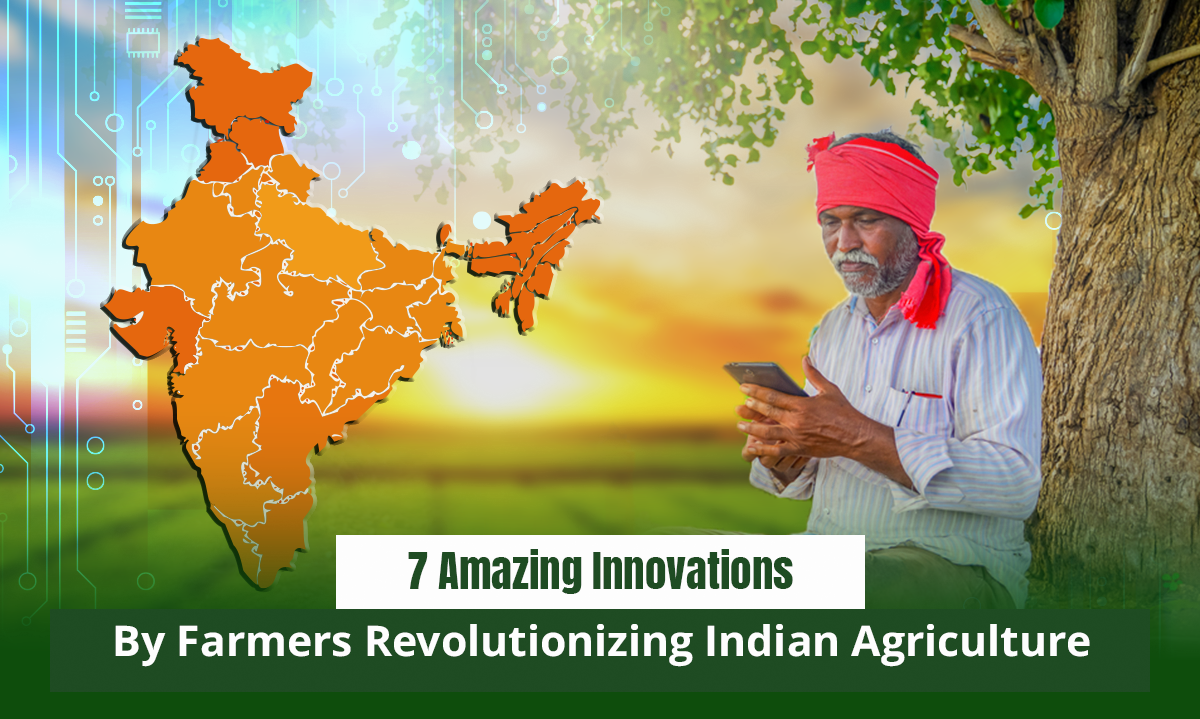Amazing Innovations by Farmers

Introduction
India's economy depends on agriculture, which is going through a lot of new and creative changes thanks to the hard work and imagination of farmers. Indian farmers are using new tools and methods because they need to quickly deal with problems like climate change, lack of water, and changing market prices. These innovative ideas not only enhance productivity but also ensure the sustainability of agricultural practices for future generations. Here are five groundbreaking new ideas that are changing the way Indian farmers work.
Precision Farming through IoT and Sensors
Precision farming uses IoT and high-tech monitors to improve farming. To keep track of real-time field data, farmers use things like soil wetness sensors, weather monitors, and GPS devices. With these findings, they can make good use of water, fertilizers, and pesticides.
Farmers can get better crops while using fewer resources if they use precision farming. For example, IoT irrigation devices in Punjab have cut water use by a lot, which is beneficial for the environment and business.
Adoption of Drones in Agriculture
Drones have changed farming by giving farmers new ways to keep an eye on and manage big areas of land. Drones equipped with advanced cameras and sensors can assess crop health, identify pests, and monitor the land. Farmers can use this technology to make decisions based on data that will help them be more productive and lose less.
In addition to tracking, drones precisely spray fertilisers and pesticides, saving time and resources. Drones quickly cover large areas, ensuring everyone completes the same amount of work. Farmers who use drones have seen big increases in their crop yields and the speed of their operations.
Bio-Fertilizers and Eco-Friendly Farming
Biofertilizers are changing farms by encouraging methods that are good for the environment. These natural soil enhancers use beneficial bacteria to make more nutrients available. This makes crops grow better without hurting the environment. Biofertilizers, on the other hand, improve the health of the land and make it more fertile over time, unlike chemical fertilizers.
Eco-friendly farming focuses on using organic materials and long-lasting methods to lower the damage to the environment. Integrated pest control, crop rotation, and other methods like these help keep resources from running out and pollution to a minimum. Biofertilizers and eco-friendly practices work together to keep the environment balanced, which is important for long-term farming success.
Hydroponics and Vertical Farming
Hydroponics is a soilless agricultural technique that grows plants using nutrition and water solutions. This novel method makes it possible for crops to develop more quickly and effectively, particularly in places with a shortage of arable land. Hydroponic systems enable year-round agricultural production due to their excellent water efficiency and suitability for use in metropolitan areas.
Vertical farming surpasses hydroponics by optimizing space and yield through the stacking of layers of plants on top of each other. Because it uses less land, costs less to move, and uses less water, it is perfect for sustainable farming in areas with lots of people. Together, hydroponics and vertical farming are the most efficient and environmentally friendly ways to grow food in the future.
Agri-Tech Apps and Digital Platforms
Digital platforms and agri-tech apps are transforming how farmers run their businesses. These platforms provide a variety of services, such as crop management and pest control advice, weather predictions, and market price updates. Farmers may increase productivity and lower risks by having access to up-to-date information and professional guidance.
Additionally, farmers may communicate directly with consumers through digital channels, which helps them sell their produce for more money. These apps also make it easier for farmers to access government programs, insurance, and financing, enabling them to make wise decisions. The emergence of agri-tech is improving the agricultural industry by bridging the gap between technology and agriculture.
The Path Ahead
In addition to revolutionizing Indian agriculture, these developments tackle global issues like climate change and food security. Indian farmers are leading the world by embracing eco-friendly techniques, leveraging technology, and implementing sustainable practices.
Conclusion
These five ideas, which range from internet platforms to precision farming, demonstrate the inventiveness and tenacity of Indian farmers. As these methods gain popularity, they promise a better, more sustainable future for agriculture. In addition to growing crops, farmers are planting the seeds of innovation and advancement for future generations.
Latest blogs
JOIN OUR COMMUNITY !
Stay connected with Getfarms! Follow us on social media for the latest updates, exclusive offers, and a glimpse into the world of farmhouse living. Join our community today




























